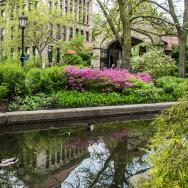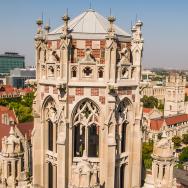Guggenheim Fellowships have been awarded this year to five University of Chicago scholars, writers and artists who examine everything from sign language to video games to theater, from medieval Islam to the 20th-century United States.
Prof. Mark Philip Bradley, Prof. Diane Brentari, Prof. Patrick Jagoda, Prof. Tahera Qutbuddin and Assoc. Prof. Catherine Sullivan are among the 175 fellows selected in this year’s class from nearly 3,000 applicants. Since 1925, the Guggenheim Fellowships have been given on the basis of prior achievement and exceptional promise—granting more than $375 million to over 18,000 individuals.
“It’s exceptionally encouraging to be able to share such positive news at this terribly challenging time,” Edward Hirsch, president of the John Simon Guggenheim Memorial Foundation, said of this year’s class, announced April 8.
Mark Philip Bradley is a leading scholar of 20th-century U.S. international history, with a focus on postcolonial Southeast Asia. His latest book, The World Reimagined: Americans and Human Rights in the Twentieth Century, explores how global events shaped and reshaped those conceptions for Americans.
The Bernadotte E. Schmitt Distinguished Service Professor, Bradley’s previous books include Vietnam at War and Imagining Vietnam and America: The Making of Postcolonial Vietnam, which won the 2002 Harry J. Benda Prize from the Association for Asian Studies.
The Guggenheim Fellowship, he said, will enable him to “move in very new directions” in his scholarship.
“It is an honor to share this award with other colleagues across the University,” Bradley said. “I am working on a project that seeks to make sense of the imaginary of the global South through conversations with contemporary artists and curators in East and Southeast Asia, and a set of experiments in the digital humanities and data visualization around new Southern political vocabularies.”
He also has co-edited several other publications, including The United States in the World, a series founded in 2006 that now spans more than two dozen books. In addition, Bradley serves as a deputy dean in the Division of the Social Sciences and the faculty director for the Pozen Family Center for Human Rights.
How does a language become a language? That’s one question that Prof. Diane Brentari is trying to answer.
First introduced to American Sign Language (ASL) as a child through her cousin, the UChicago linguist focuses on how sign languages emerge in Deaf communities, and how protactile languages—which use neither sight nor sound—emerge in DeafBlind communities. The Guggenheim fellowship will help further Brentari’s study of non-spoken languages, which will uncover insights into language development at large.
“For spoken languages, we can no longer access the moments when a communication system becomes a language,” said Brentari, the Mary K. Werkman Professor and co-director of the Center for Gesture, Sign and Language in the Department of Linguistics. “However, for signed and protactile languages, it is possible to actively observe a number of important factors involved in language emergence and to prioritize the most significant elements.”
Brentari’s interdisciplinary research is rooted in crosslinguistic collaborative work on sign languages—including ASL, Nicaraguan Sign Language, Italian Sign Language, Hong Kong Sign Language, among others—as well as on protactile languages of DeafBlind communities. Her Guggenheim project, writing a book on Observing the Creation of Language, will analyze how various components of grammar emerge in sign languages and in the protactile language used by DeafBlind people in the United States.
What can medical professionals learn from personal stories about gender, race and sexuality that they can’t from clinical exams? For Prof. Patrick Jagoda, this is the sort of discussion that can be shaped by game design and digital storytelling—combining play with a serious exploration of public health and social justice.
The UChicago scholar explores the arts in the digital age, grounding his research in English, creative writing and philosophy while collaborating across disciplines. That work has resulted in alternate reality games for first-year students in the College, with the most recent project focusing on climate change.
Jagoda will use the Guggenheim Fellowship to help support an experimental and collaborative humanities multimedia publication, Story Lab: Narrative Methods for a Transmedia Era.
“This project examines how emergent forms in the arts and humanities can influence public health and the social sciences,” said Jagoda, who teaches in the Departments of English Language and Literature and Cinema and Media Studies. “Digital storytelling, body mapping, transmedia collage, speculative design, narrative videogames and alternate reality games introduce new methods to communicate and collaborate among multiple disciplines.”
As co-founder of the Game Changer Chicago Design Lab and Transmedia Story Lab, he supports teams who create analog and digital games, as well as transmedia narratives. Jagoda also has helped establish student spaces at UChicago—such as the Weston Game Lab and the Media Arts, Data and Design Center—that foster collaborative game design projects.
Since she began graduate school in Cairo more than 30 years ago, Prof. Tahera Qutbuddin has worked intermittently on the legacy of ʿAli ibn Abi Talib—one of the most beloved and influential figures in early Islam.
With the support of the Guggenheim Fellowship, that decades-long project may soon find a new form. An expert in Arabic literature and Islamic studies, Qutbuddin plans to devote the next year toward a new monograph, ʿAli ibn Abi Talib: Life, Teachings, and Eloquence of the Sage of Islam. The proposed book will draw primarily on Ali’s own orations and epistles to reconstruct his biography and thought.
Both the Shia and the Sunnis regard ʿAli as a “master orator, wise sage, pious ascetic, just leader, champion for the weak, and exemplary guide for this world and the next,” said Qutbuddin.
“It is inexplicable that in the 21st century—a time of flourishing scholarship on Islamic history and Arabic literature—no Western-language academic monograph systematically addresses his life, teachings, and literary production,” she said.
The project is complicated by various factors, including the authenticity of ʿAli’s orations—which were passed from person to person for more than a century with the help of mnemonic devices. ʿAli’s archaic vocabulary, among the most beautiful and difficult in the Arabic literary canon, also requires expertise in classical Arabic philology and literary context.
Fluent in five languages, Qutbuddin’s interdisciplinary scholarship focuses on the connections between literary, religious and political traditions—delving into the Qur’an, poetry and prose, preaching and sermons, Shi’i studies, and Arabic in India.
Qutbuddin is also translating a compilation of the orations, epistles, and sayings of ʿAli, assembled by al-Sharif al-Radi, a renowned medieval Shi’ite Muslim scholar. She was previously named a Carnegie Scholar, part of a 2008 cohort selected for its “compelling ideas and commitment to enriching the quality of the public dialog on Islam.”
Trained as an actor and visual artist, Assoc. Prof. Catherine Sullivan began publicly presenting film, theater and installation works in the early 2000s. Her work combines an interest in the psychic and cultural dilemmas inherent in dramatic acting and the ways history can be projected through the body.
The Guggenheim Fellowship will support film and performance projects concerned with experimental forms of group work that might contribute to disciplines of reconciliation and redress.
“Some of what I planned for the fellowship year won't be possible for a while, but the pandemic is creating new kinds of group work that I have to take in and test out,” said Sullivan, who teaches in the Department of Visual Arts. “Also, I'm trying to come to terms with what I need to be doing at a moment like this given the pain and stress this crisis exacerbates.”
Her other work resides in a number of public and private collections around the world, including the Whitney Museum of American Art in New York, the Museum of Contemporary Art in Los Angeles, and Tate Modern in London. Her art has also been included in the Berlin International Film Festival and International Film Festival Rotterdam.
Sullivan’s previous honors include the Louis Comfort Tiffany Foundation Biennial Award, the Herb Alpert Award in the Arts, and the United States Artists Walker Fellowship.

